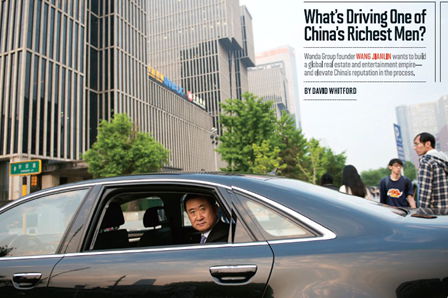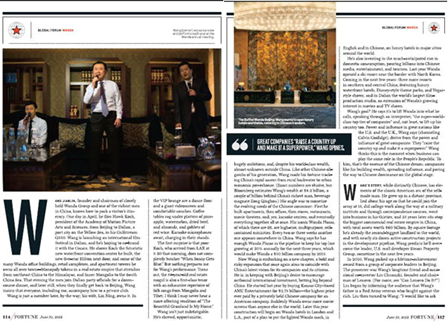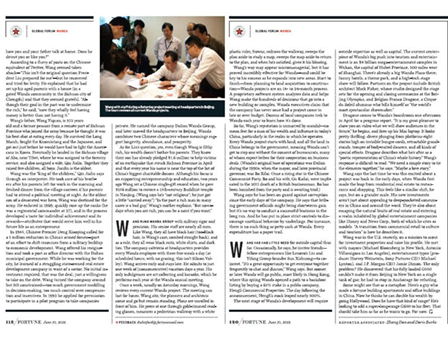王健林董事长登上美国《财富》杂志封面
发布时间:2013-06-03 作者:企业文化部
万达集团董事长王健林登上最新一期美国《财富》英文版杂志封面,他是近年来登上《财富》封面为数不多的中国企业家之一,这也意味着王健林和他打造的万达集团的国际影响力越来越大。
《财富》在这篇名为“解密中国最富有的人之一”的文章中,用6个版的篇幅描述了王健林的创业历程,特别是近几年万达集团国际化和文化旅游产业发展情况。在《财富》看来,王健林是一位目标远大、善于把握时机、热衷慈善的企业家。王健林的目标是使万达跻身世界一流企业行列,从而帮助提高中国国家实力,这就是他的中国梦。为此,万达正在进行从商业地产向文化旅游的大转型,这将使万达从一家传统不动产企业变成以文化产业为主的企业。文章还介绍了王健林鲜为人知的一面,称赞他擅长中国西部民歌,是一流的男高音。
据悉,《财富》杂志对王健林的报道非常重视,特别派遣资深记者及摄影师到中国,对王健林进行了长达一周的跟踪采访,跟随他出席各类活动,最终呈现出一个真实、全面、生动的王健林。《财富》杂志6月在成都主办第12届“财富全球论坛”,这期杂志也作为会刊发放给所有参会者。
2012年,万达集团以26亿美元收购美国AMC公司100%股权,成为中国企业在美国最大一桩企业并购,在美国和全世界引起极大反响,王健林因此成为受西方主流媒体关注的中国企业家之一。在登上《财富》杂志封面之前,《福布斯》、纽约时报、华尔街日报等全球十几家重要媒体已经对王健林进行过重点报道。现在,万达快速发展的国际化和对世界文化旅游产业的创新更加强烈地吸引着全球目光,人们非常期待万达给全球商业世界带来的创新和改变。



中文译作:
《财富》专访王健林:解密中国最富有的人之一
王健林,万达集团的创始人和董事长,是中国最富有的人之一。他知道如何安排访客的行程。今年四月,他用他的私人飞机把来访的美国电影艺术与科学学院主席霍克·考奇先生从北京送去大连。王健林要在大连开办一个电影节,他希望把这个电影节与奥斯卡联系起来。他向考奇展示了万达的后现代风格的会展中心,邻近就是五星级的希尔顿酒店,还有一系列万达的写字楼、购物中心、公寓楼。当晚回北京后,王健林坚持邀请所有人去他的私人会所小聚。
王健林的夫人林宁是会所的所有者,VIP厅里有舞池、巨大的屏幕、沙发,各种小吃和红酒,以及卡拉OK设备。考奇唱得还不错,但王健林的歌喉让我大吃一惊,这位58岁的地产大亨是个一流的男高音,擅长蒙古和西藏的民歌。我还没有听过比他唱的《美丽的草原我的家》更动听的版本。
王健林并不仅仅是个埋头苦干的人。他很精明,善于抓住机会,非常雄心勃勃。尽管他是世界级的富翁,在中国之外却很少人知道他。正如他同时代的中国商业巨头那样,王健林抓住了中国从落后的农业国迈向城市经济大国的机遇(彭博社估计王健林的财富达到83亿美元)。他的策略是从中国消费者不断增长的需要中挣钱,先是盖公寓楼,然后是写字楼、商场、电影院、KTV。他在中国有69个万达广场,这里面有摩天大楼,是多功能自给自足的小城市。万达广场几乎每两三个星期就开业一个。王健林说,他有足够多的万达广场项目储备,在未来3年内,公司每年的增长率能够达到30%,2015年收入将达到500亿美元。
王健林正在开始一个新的篇章,这个勇敢和带有风险的扩张计划符合国家对万达的期待。他响应政府鼓励对外投资的号召,大举向海外进军。去年他以27.5亿美元买下AMC公司,这是中国民营企业收购美国公司付出的最高价格。一夜之间,万达拥有了全世界最多的电影屏幕。今年万达还将在伦敦和洛杉矶建造酒店,王健林计划使万达的logo印在全世界大城市的豪华酒店。
王健林也向国内的媒体、娱乐和旅游投入数十亿美元的资金,中国的国内消费还将不断增长。去年万达在靠近朝鲜边界的长白山开了一个滑雪场。在未来的几年内,万达还将在华南和华中建造3个旅游城,拥有豪华酒店,迪士尼式的主题公园和拉斯维加斯式的秀场。万达对影视行业的兴趣也不断增长,还在大连将建造一个电影制作基地。
万达的目标是什么?王健林说,目标是使万达跻身世界超一流公司的行列,同时也提高中国的实力。王健林说,世界大国(如英国和美国)的力量和影响力来自这些国家拥有的伟大公司,这些公司促进了国家的发展。王健林认为,公司也将在中国的发展中发挥同样的作用。对他来说,这就是中国梦的核心:像万达这样的公司不断聚集财富,扩大影响力,为中国在国际舞台上的主导地位铺平道路。
王健林的创业故事虽然是中国式的,但也包含了美国白手起家获得成功的经典元素。王健林成长在一个偏远的省份,谎报年龄从而在15岁就能参军,通过函授课程在军校学习,在30多岁时开始经商,25年后拥有了中国最大的商业地产公司,总资产达到600亿美元。从持有物业面积来看,他已经成为世界第二大不动产业主。万达的发展计划里目前包含大约72个在建项目,王健林预测万达在未来几年中将超越美国的西蒙房地产公司,成为全球最大的不动产企业。
2010年,王健林在北京获得企业领袖终身成就奖,颁奖的是联想主席柳传志。柳传志介绍时告诉观众,王健林的父亲是打土豪的老红军,然后他转身问王健林:“我想问你和父亲在家里是怎样交谈的?他是讨厌你还是喜欢你?”
根据微博的帖子,王健林当时大吃一惊:“这不是柳主席原本为我准备的问题。”但他很快恢复了镇定,解释说他已经为年老的父母盖了房子(在四川成都一个万达小区里),他的父母挺感谢的。“虽然在过去,他们的目标是打倒富人阶级,现在他们完全意识到,有钱比没有钱好。”
王健林的父亲已经102岁了,曾经在四川务农,为了解决温饱而参军,经历了长征、国共内战和抗日战争,还差一点参加了抗美援朝。最后他荣归故里,在四川阿坝从事林业工作并结婚生子。他一共有五个孩子,都是男孩,王健林是长子。
据王健林的母亲回忆,王健林是“孩子王”。父母早上去上班后,他照顾几个弟弟,晚上父母去参加政治会议,他就负责从村子的食堂打饭回家。作为战斗英雄的长子,他注定要参军。在1969年,王健林入伍,表现出色,在27岁就成为了一名正团职干部。军队孕育了王健林建功立业的决心,并且为他日后成为一名企业家打下基础。
在1987年,为了响应国家“百万裁军”的号召,王健林告别了十多年的部队生活。转业后,王健林来到大连市西岗区区政府任办公室主任。一年后,一个偶然的“机会”使得王健林的人生轨迹发生了重大转变———负债数百万元的西岗区住宅开发公司濒临破产,区政府为了拯救这个“烂摊子”,面向全区公开招贤。王健林主动请缨,自愿去担任西岗住宅开发公司经理。自此,王健林踏入了地产圈。不过在期间王健林也感觉到了很多束缚——太多的行政干预,以及对补偿和福利太多的管控。1992年8月,王健林争取到了企业改制的机会,大连市西岗住宅开发公司也正式改名为大连万达集团股份有限公司,后来将总部迁至北京。万达由两个汉字组成,寓意长久、富足和繁荣。
虽然王健林已经太富有了,但他的富有并未给他父母带来困扰。他们知道他们的儿子给雅安地震的灾民捐了160万美元,每年他的名字接近中国慈善榜的榜首。尽管他的慈善主要用于帮助企业和教育事业,但两年前,他给南京的一座古庙捐款1.56亿美元用于修缮(王健林自称不信宗教,只是比较推崇佛教)。王健林的母亲说:“曾经有钱人总被认为是坏人,但现在有钱人也可以变成圣人,只要你有这个心。”
王健林用军队的严谨和严格来管理万达。万达的高级职员基本都是男性。和王健林一样,他们也都是黑头发(特别黑,整齐地梳到后面),而且按照规定,他们全穿黑西装、白衬衫,系深色领带。万达的食堂在规定的时间内为员工提供免费的三餐,但严禁吃零食。王健林总是到得早,走得晚。他承认一年只有一周假期,而且不是连着休的。他唯一的嗜好就是收藏和卡拉OK,他每年都在万达年会上献歌。
每周六早上,王健林召开审图会。一般要持续一个小时,他坐着,其他人站着。他戴着金边眼镜看着图纸,用一把白色塑料尺子量图纸上的人行道,皱着眉头重新把人行道画了一遍,然后把图纸扫到一边,开始研究地图,随后把地图也扫到一边,重新把图纸拿过来研究直到他满意。
王健林的方式有点太事必躬亲了,不过这也是很有效率的一种方式,保证他新开拓的业务能够成功。从做规划到买地到施工,万达的项目周期在18到24个月。王健林拥有一个专属的软件来帮助他做决策。万达的高管透露,万达从来没发生过项目延期竣工或者超过预算的情况。每年都有几十家公司来万达取经。
至今王健林没有被卷入任何丑闻中。在房地产行业,对于他这么一位富有又有影响力的人来说,这是很不容易的。所有万达的项目都从土地开始,而中国所有的土地都属于政府所有,所以万达必须要和政府打交道才能开展业务。政府工作人员很多都是想从商业项目中谋取私利的。
王健林说,他从早年创业时就严禁贪污。他说,贿赂政府官员有可能带来短期的效益,但是这不是长久之计。为了杜绝违反职业道德的行为,他通过集团的监管部门进行严格管控。在万达每一笔支出都需要审批。
至今为止,王健林并不需要太多外界的资金。他偶尔会邀请企业家朋友们小聚并商讨投资计划。他说:“大家经常聚聚,讨论讨论,挺好的。”不过万达迟早要上市,应该是在香港。今年春天万达购买了恒力地产65%的股份用来借壳上市。消息一出,恒力当日股价飙升了500%。
万达下一步的发展需要更多的外部人才和资金。万达主推的旅游文化产业中,最重要的是武汉中央文化区,这是一个大型娱乐休闲中心。武汉已经有了一个万达广场,接下来要打造高级酒店、主题公园、高科技舞台表演等等。武汉中央文化区的合作伙伴包括全球舞台艺术第一人——弗兰克·德贡,他曾策划导演美国拉斯维加斯“O秀”、“梦秀”、澳门“水舞间”等著名舞台节目,还有马克·菲舍尔,曾担任北京奥运会、广州亚运会、伦敦奥运会开闭幕式艺术总监。
德贡在今年四月的一个下午来向王健林汇报项目进展,用视频演示了舞台秀的大致情况。看上去非常打动人心:演员系着弹力绳,从八层楼高的平台上纵身一跃;看台是可伸缩的;各种特效眼花缭乱。德贡说他要以诗般的意境展示中国的整个历史。王健林的反馈有点让人摸不着头脑:“我们需要一个简单故事把这些元素串起来,比如爱情故事。”
王健林回忆说,上一次让他感到特别兴奋的事情是万达从住宅地产向商业地产转型。现在面临另一次转型,但是规模更大。这次转型不只是为了赚中国人和外国人的钱,而是想从地产行业的自然属性中解放出来,转向由迪斯尼和新闻集团这样的公司主导的娱乐文化行业中。王健林说:“这是一次由商业地产向文化旅游行业的转型。”
王健林近期访问了美国,意图寻找地产投资的机会,同时也提升自身形象。他会见了纽约市长布隆伯格和洛杉矶市长安东尼奥·维拉戈沙,制片人哈维·韦恩斯坦和索尼影视娱乐有限公司CEO迈克尔·林顿,以及摩根大通CEO杰米·戴蒙。唯一的问题是,他的私人飞机G550不能从北京直飞到纽约,必须要在安克雷奇加一次油。
这次加油事件似乎有寓意。王健林已经通过建造住宅和写字楼在中国成为了富豪,现在他希望通过好莱坞将他的财富翻倍。他能走这么远吗?现在他正想把他的飞机升级为G650,这样他就能去到任何想去的地方了。
英文报道原文:
What's driving one of China's richest men?
Wang Jianlin , founder and chairman of closely held Wanda Group and one of the richest men in China, knows how to pack a visitor's itinerary. One day in April, he flies Hawk Koch, president of the Academy of Motion Picture Arts and Sciences, from Beijing to Dalian, a port city on the Yellow Sea, in his Gulfstream G550. Wang is launching an international film festival in Dalian, and he's hoping to co-brand it with the Oscars. He shows Koch the futuristic new waterfront convention center he built, the new five-star Hilton next door, and some of the many Wanda office buildings, retail complexes, and apartment towers he owns all over town -- Monopoly tokens in a real estate empire that stretches from northeast China to the Himalayas, and Inner Mongolia to the South China Sea. That evening the men join Dalian party officials for a dozen-course dinner, and later still, when they finally get back to Beijing, Wang insists that everyone, including me, accompany him to a private club.
Wang is just a member here, by the way; his wife, Lin Ning, owns it. In the VIP lounge are a dance floor and a giant videoscreen and comfortable couches. Coffee tables sag under platters of pineapple, watermelon, dried beef, and almonds, and goblets of red wine. Karaoke microphones await, charging in their stands.
The first surprise is that poor Koch, who arrived from LAX at 5:30 that morning, does not completely butcher "When Sonny Gets Blue." But nothing prepares me for Wang's performance. Turns out, the 58-year-old real estate mogul is also a first-class tenor with an exhaustive repertoire of folk songs from Mongolia and Tibet. I think I may never hear a more affecting rendition of "The Beautiful Grassland Is My Home."
Wang isn't just indefatigable. He's shrewd, opportunistic, hugely ambitious, and, despite his world-class wealth, almost unknown outside China. Like other Chinese oligarchs of his generation, Wang made his fortune tracking China's rapid ascent from rural backwater to urban economic powerhouse. (Exact numbers are elusive, but Bloomberg estimates Wang's wealth at $8.3 billion, a couple of billion behind China's richest man, beverage magnate Zong Qinghou.) His angle was to monetize the evolving needs of the Chinese consumer: First he built apartments, then offices, then stores, restaurants, movie theaters, and, yes, karaoke centers, and eventually everything together all at once. His iconic Wanda Plazas, of which there are 69, are high-rise, multipurpose, self-contained minicities. Every two or three weeks another one appears somewhere in China. Wang says he has enough Wanda Plazas in the pipeline to keep his top line growing at 30% annually for the next three years, which would make Wanda a $50 billion company by 2015.
Now Wang is embarking on a new chapter, a bold and risky expansion that once again aims to coincide with China's latest vision for its companies and its citizens. He is, in keeping with Beijing's desire to encourage outbound international investment, betting big beyond China. He started last year by buying Kansas City-based AMC Entertainment for $2.75 billion -- the highest price ever paid by a privately held Chinese company for an American company. Suddenly Wanda owns more movie screens than anyone else in the world. Later this year construction will begin on Wanda hotels in London and L.A., part of a plan to put the lighted Wanda mark, in English and in Chinese, on luxury hotels in major cities around the world.
He's also investing in the much-anticipated rise in domestic consumption, pouring billions into Chinese media, entertainment, and tourism. Last year Wanda opened a ski resort near the border with North Korea. Coming in the next few years: three more resorts in southern and central China, featuring luxury waterfront hotels, Disney-style theme parks, and Vegas-style shows; and in Dalian the world's largest film-production studio, an extension of Wanda's growing interest in movies and TV shows.
Wang's goal? He says it's to lift Wanda into what he calls, speaking through an interpreter, "the super-world-class top tier of companies" and, not least, to lift up his country too. Power and influence in great nations like the U.S. and the U.K., Wang says (channeling Calvin Coolidge), derive from the power and influence of great companies: They "raise the country up and make it a superpower." Wang thinks this is the moment when business can play the same role in the People's Republic. To him, that's the essence of the Chinese dream: companies like his building wealth, spreading influence, and paving the way to Chinese dominance on the global stage.
Wang's story, while distinctly Chinese, has elements of the classic American arc of the self-made man. He grew up in a distant province, lied about his age so that he could join the army at 15, did college work along the way at a military institute and through correspondence courses, went into business in his thirties, and 25 years later sits atop the biggest commercial real estate empire in China, with total assets worth $60 billion. By square footage he's already the second-biggest landlord in the world, and with nearly six dozen active construction projects in the development pipeline, Wang predicts he'll overcome the leader, U.S. mall developer Simon Property Group, sometime in the next few years.
In 2010, Wang picked up a lifetime-achievement award from a group of corporate leaders in Beijing. The presenter was Wang's longtime friend and occasional co-investor Liu Chuanzhi, founder and chairman of Lenovo. (For more, see "Can Lenovo Do It?") Liu began by informing the audience that Wang's father is a Red Army veteran who fought against the rich. Liu then turned to Wang: "I would like to ask how you and your father talk at home. Does he detest you or like you?"
According to a flurry of posts on the Chinese equivalent of Twitter, Wang seemed taken aback -- "This isn't the original question President Liu prepared for me" -- but he recovered and tried for levity. He explained that he had set up his aged parents with a house (in a gated Wanda community in the Sichuan city of Chengdu) and that they seemed grateful. "Although their goal in the past was to undermine the rich," he said, "now they wholly feel having money is better than not having it."
Wang's father, Wang Yiquan, is 102 years old and a former peasant from a remote part of Sichuan Province who joined the army because he thought it was his best shot at eating every day. He survived the Long March, fought the Kuomintang and the Japanese, and got out just before he would have had to fight the Americans in Korea. Eventually he landed in the Sichuan village of Aba, near Tibet, where he was assigned to the forestry service, and also assigned a wife, Qin Jialin. Together they raised five children, all boys. Jianlin is the oldest.
Wang was the "king of the children," Qin Jialin says through an interpreter. He took care of his brothers after his parents left for work in the morning and fetched dinner from the village canteen if his parents had to attend a political meeting at night. As the oldest son of a decorated war hero, Wang was destined for the army. He enlisted in 1969, quickly rose up the ranks (he was a regimental commander at 27), and in the process developed a taste for individual achievement and its rewards -- attributes that would serve him well in his future life as an entrepreneur.
In 1985, Chinese Premier Deng Xiaoping called for a 1 million reduction in China's armed forces -- part of an effort to shift resources from a military buildup to economic development. Wang offered his resignation and took a post as office director with the Dalian municipal government. While he was working for the city, he learned of a struggling state-owned real estate development company in want of a savior. No initial investment required, that was the deal; just a willingness to take on the debt. Wang turned the company around but felt constrained -- too much government meddling in decision-making, too much control over compensation and incentives. In 1992 he applied for permission to participate in a pilot program to take companies private. He named the company Dalian Wanda Group, and later moved the headquarters to Beijing. Wanda combines two Chinese characters whose meanings suggest longevity, abundance, and prosperity.
______________________________________________________________________________
As for Liu's question, yes, even though Wang is filthy rich, his wealth doesn't bother his parents. They know their son has already pledged $1.6 million to help victims of an earthquake that struck Sichuan Province in April and that every year his name is near the top of the list of China's biggest charitable donors. Although his focus is on supporting entrepreneurship and education, two years ago Wang set a Chinese single-gift record when he gave $156 million to restore a 15th-century Buddhist temple in Nanjing. (Wang says he's "not religious"; he just got a little "carried away.") "In the past a rich man in many cases is a bad guy," Wang's mother explains. "But nowadays when you are rich, you can be a saint if you want."
Wang runs Wanda Group with military rigor and precision. His senior staff are nearly all men. Like Wang, they all have black hair (too-black hair, in Wang's case, combed straight back), and as a rule, they all wear black suits, white shirts, and dark ties. The company cafeteria at headquarters provides every Wanda employee with three free meals a day (at scheduled hours, with no grazing; this isn't Silicon Valley). Wang arrives early and stays late. He admits to just one week of (nonconsecutive) vacation days a year. His only indulgences are art collecting and karaoke, which he performs each year at the Wanda annual meeting.
Once a week, usually on Saturday mornings, Wang reviews every current Wanda project. The meeting can last for hours. Wang sits; the planners and architects come and go but remain standing. Plans are unrolled in front of him. He peers at one through gold-rimmed reading glasses, measures a pedestrian walkway with a white plastic ruler, frowns, redraws the walkway, sweeps the plan aside to study a map, sweeps the map aside to return to the plan, and when he's satisfied, gives it his blessing.
Wang's way may appear micromanagerial, but it has proved incredibly effective for Wanda -- and could be key to his success as he expands into new areas. Start to finish -- from planning to land acquisition to construction -- Wanda projects are an 18- to 24-month process. A proprietary software system analyzes data and helps Wang make the hundreds of decisions that go into a new building or complex. Wanda executives claim that the company has never once had a project come in late or over budget. Dozens of local companies trek to Wanda each year to learn how it's done.
So far, Wang's reputation is unmarred by scandal -- no mean feat for a man of his wealth and influence in today's China, particularly in the realm in which he operates. Every Wanda project starts with land, and all the land in China belongs to the government, meaning Wanda can't get to step one without the consent of bureaucrats, many of whom expect bribes for their cooperation on business deals. (Wanda's original base of operations was Dalian during the 1990s, when the mayor, and later provincial governor, was Bo Xilai. Once a rising star in the Chinese Communist Party, Bo and his wife, Gu Kailai, were implicated in the 2011 death of a British businessman. Bo has been banished from the party and is awaiting trial.)
Wang says he has been on guard against corruption since the early days of the company. He says that bribing government officials might bring short-term gain but it's no way to conduct a successful business in the long run. And he has put in place strict controls to discourage unethical behavior by underlings. For instance, there is no such thing as petty cash at Wanda. Every expenditure has a paper trail.
Wang has had little need for outside capital thus far. Occasionally, he says, he invites friends -- fellow entrepreneurs like Lenovo's Liu and Yifang Group founder Sun Xishuang -- to co-invest. "It's a great opportunity to get everyone together frequently to chat and discuss," Wang says. But sooner or later Wanda will go public, most likely in Hong Kong, where this spring Wanda opened a path to a backdoor listing by buying a 65% stake in a public company, Hengli Commercial Properties. The day following the announcement, Hengli's stock leaped nearly 500%.
The next stage of Wanda's development will require outside expertise as well as capital. The current centerpiece of Wanda's big push into tourism and entertainment is an $8 billion mega-entertainment complex in Wuhan, the capital of Hubei Province, 500 miles west of Shanghai. There's already a big Wanda Plaza there; luxury hotels, a theme park, and a high-tech stage show will follow. Partners on the project include British architect Mark Fisher, whose studio designed the stage sets for the opening and closing ceremonies at the Beijing Olympics, and Belgian Franco Dragone, a Cirque du Soleil alumnus who bills himself as "the world's most spectacular showmaker."
Dragone comes to Wanda's boardroom one afternoon in April for a progress report. "It is my great pleasure to show you on video what we will show audiences in the future," he begins, and fires up his Mac laptop. It looks pretty thrilling: divers plunging from platforms eight stories high on invisible bungee cords, retractable grandstands, troupes of body-suited dancers, and all kinds of special effects. Dragone describes what he's after as a "poetic representation of China's whole history." Wang's response is difficult to read. "We need a simple story to tie the elements together," he says. "Maybe a love story."
Wang says the last time he was this excited about a project was back in the early days, when Wanda first made the leap from residential real estate to restaurants and shopping. This feels like a similar shift, he says, but on a grander scale. His new investments aren't just about appealing to deep-pocketed consumers in China and around the word. They're also about escaping the natural limits of real estate and entering a realm inhabited by global entertainment companies like Disney and News Corp., both of which he cites as models. "A transition from commercial retail to culture and tourism" is how he describes it.
Wang was in the U.S. recently, on a mission to scout for investment properties and raise his profile. He met with mayors (Michael Bloomberg in New York, Antonio Villaraigosa in Los Angeles), entertainment types (producer Harvey Weinstein, Sony Pictures CEO Michael Lynton), and J.P. Morgan CEO Jamie Dimon. The only problem? He discovered that his fully loaded G550 couldn't make it from Beijing to New York on a single tank of gas; he had to stop in Anchorage for refueling.
Some might see that as a metaphor. Here's a guy who made a fortune building apartments and office buildings in China. Now he thinks he can double his wealth by going Hollywood. Does he have that kind of range? He's looking to add a super-long-range G650 to his fleet. That should take him as far as he wants to go. For now.
上一篇: 王健林董事长在东方影都启动表彰会上的讲话
下一篇: 王健林董事长接受媒体专访解读三中全会公报
